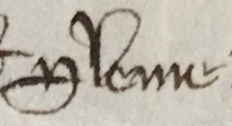Slema daughter of Isaac of Southwark
Referred to in records as: “Slema”, “Slema of Southwark”, “Slemam”, “Slemʼ”, “widow”.
Brief biography

Slema was the daughter of Zipporah and Isaac of
Southwark. Her father was a prominent attorney and financier in the late
thirteenth century. Though Slema became an independent financier herself—the prioress
of
Kilburn Abbey brought debt suits against her in 1277—she is especially notable for
a
property dispute that occurred in 1274, when she was an underage widow. That summer,
a
Christian woman called Elice (or Elicia), the widow of Nicholas le Taylur, appeared
before the justices of the Exchequer of the Jews at Westminster to sue Slema for
surrender of a house and land in Southwark that she had inherited from her husband.
Slema, Elice said, had right to the property only because her husband Nicholas had
sold it
to a Southwark clerk called William, and Elice had been unable to stop that sale during
Nicholas’s lifetime. Slema’s father likely held the property in pledge from this
William, and, it seems, the financials remained in dispute. Slema failed to appear
in
court though summoned, and the property was seized by the king. By that winter, however,
Slema sued to get it back, and Elice continued to push her point, now because Slema’s
original failure to appear amounted to default. With Slema still underage, her attorney
father responded on her behalf: Slema had in fact never been summoned. Elice countered
that, in any case, Slema only had right to the property through the disputed sale
to
the clerk William. Young Slema asked for a viewing of the property before proceeding
further, after which she informed the court that she held only a portion of it through
her father, the part that Nicholas had sold. Elice responded that Slema held the whole
property and saw it all. With both the nature of the claim and the size of the property
in question, the case was referred to a jury, though no further records of it survive.
It is possible that some of the problem arose from missing documents that might back
up
Slema’s claims: amid this property dispute in 1274, men had broken into her
father’s Guildford home and stolen his belongings, including his debt bonds, which
he
struggled to reclaim into the 1280s. During Slema’s 1277 dealings with the prioress
of
Kilburn Abbey, the Surrey sheriff (John de Walton) reported that Slema could not be
found in his bailiwick because she now lived in the city of London, though others
testified that
sleeping and wakingshe lived in Southwark. It is of course possible that she moved between London and Southwark (now a district of London): her father, who was dead by 1290, certainly did business in both places, and her mother Zipporah held property in the London Jewry at the time of the 1290 expulsion.
The 1274 Southwark property case, indeed, reveals evidence of Slema’s father bringing
her into
his family business at a young age, even as the related interaction between the two
widows shows how both Christian and Jewish women might be uncomfortably bound to the
legal actions of their male relatives.
Further reading
- Emma Cavell, The Measure of Her Actions: A Quantitative Assessment of Anglo-Jewish Women’s Litigation at the Exchequer of the Jews, 1219–81, Law and History Review 39.1 (2021): 135–72.
- Hoyle, Victoria, The Bonds that Bind: Moneylending between Anglo-Jewish and Christian Women in the Plea Rolls of the Exchequer of the Jews, 1218–1280, Journal of Medieval History 38 (2008), pp.119–129, pp. 119–129..
Dates mentioned in records
1274–1277
Locations
Surrey, Sussex

